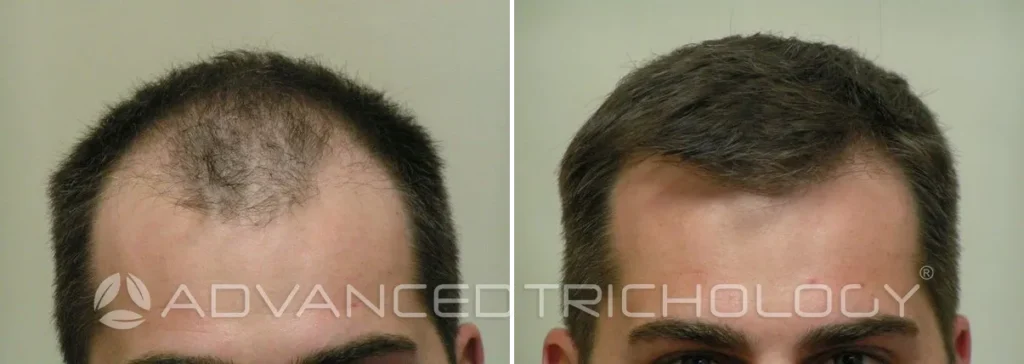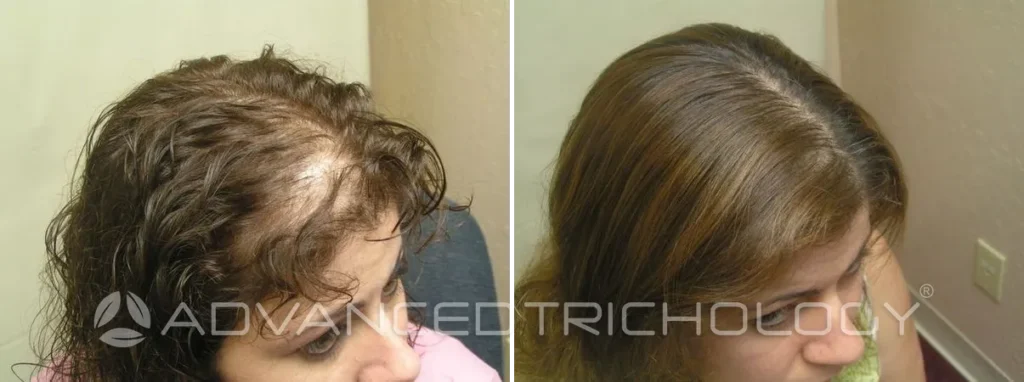Introduction
Hair loss can be a distressing concern, affecting not only our appearance but also our self-esteem. While there are various reasons behind hair loss, one that often flies under the radar is Sjogren’s syndrome. This chronic autoimmune disorder, primarily known for causing dry eyes and mouth, may have a surprising link to your hair’s health. In this article, we’ll explore the perplexing connection between Sjogren’s syndrome and hair loss, shedding light on the mechanisms, symptoms, and potential remedies.
Effortless Hair Loss Prevention and Growth!
If you’re committed to preventing hair loss and promoting natural hair growth, look no further than Advanced Trichology. With a proven track record and a wide range of high-quality hair growth products suitable for both men and women, Advanced Trichology is a trusted name in the field. As an affiliate, I’ve had the privilege of witnessing the remarkable results their products can deliver. By using my unique affiliate link, you can access exclusive discounts on Advanced Trichology products through their website. It’s the perfect opportunity to take control of your hair’s health and vitality. Don’t let hair loss hold you back; start your journey towards healthier, fuller hair today!


Understanding Sjogren’s Syndrome: A Brief Overview
Before delving into the hair loss aspect, let’s grasp the basics of Sjogren’s syndrome. This condition, predominantly affecting women aged 40 to 60, is characterized by the immune system’s misguided attack on the body’s moisture-producing glands. This assault primarily impacts the eyes and mouth, resulting in the hallmark symptoms of dry eyes and dry mouth. However, Sjogren’s syndrome is anything but straightforward, as it can affect various other body parts, including nerves, joints, and, as we’ll discover, even hair follicles.
The Perplexing Link Between Sjogren’s Syndrome and Hair Loss
Autoimmune Aggression:
Sjogren’s syndrome is fundamentally an autoimmune disorder, meaning that the immune system turns against the body’s own tissues. In this context, it targets the glands responsible for producing tears and saliva. However, this immune aggression can extend beyond these glands to affect other bodily functions, including hair follicles.
Hair Follicles Under Attack:
In some cases, individuals with Sjogren’s syndrome report hair loss as a consequence of the condition. The mechanism behind this phenomenon isn’t fully understood, but it is believed that the immune system’s attacks on hair follicles may disrupt the natural hair growth cycle, leading to hair thinning or loss.
Symptoms to Watch Out For
If you’re grappling with both Sjogren’s syndrome and hair loss, you may experience a range of symptoms that warrant attention:
- Dry, Thinning Hair: One of the most apparent signs is a gradual thinning of your hair, often accompanied by increased dryness.
- Scalp Sensitivity: You might notice heightened sensitivity or discomfort on your scalp, similar to how other areas of your body experience dryness.
- Hair Texture Changes: The texture of your hair may change, becoming more brittle or fragile.
- Patchy Hair Loss: Some individuals report patchy hair loss, where certain areas of the scalp experience more significant hair thinning.
- Slower Hair Growth: Hair growth may slow down, resulting in longer gaps between haircuts.
- Hair Breakage: Due to increased brittleness, hair may break more easily, leading to shorter strands.
- Hair Loss Beyond the Scalp: In rarer cases, Sjogren’s syndrome-related hair loss can extend beyond the scalp to affect body hair.
Exploring Potential Remedies
If you’re dealing with hair loss associated with Sjogren’s syndrome, you’re likely searching for solutions. While there’s no one-size-fits-all remedy, here are some strategies to consider:
- Medical Consultation: The first step is consulting a medical professional who can assess your condition and recommend appropriate treatments. Medical professionals might recommend you consult with a specialist, potentially a dermatologist.
- Manage Sjogren’s Syndrome: Effectively managing Sjogren’s syndrome is crucial. This often involves medications and lifestyle changes to alleviate symptoms of dryness, which may indirectly benefit your hair.
- Hair Care Routine: Adopt a gentle hair care routine that minimizes stress on your hair. Avoid excessive heat styling and tight hairstyles that can contribute to hair breakage.
- Nutritional Support: Ensure you’re consuming a balanced diet rich in essential nutrients for hair health, such as biotin, vitamins, and proteins.
- Topical Treatments: Some individuals find relief in using topical treatments, such as minoxidil, which may stimulate hair growth.
- Wig or Hairpieces: If hair loss is significant, consider using wigs or hairpieces as temporary solutions while awaiting regrowth.
Conclusion: Navigating Hair Loss with Sjogren’s Syndrome
Hair loss associated with Sjogren’s syndrome can be perplexing and challenging, but it’s important to remember that you’re not alone. Seeking medical guidance and adopting a holistic approach to manage both the autoimmune condition and your hair health is key. While there’s no guaranteed fix, understanding the connection between Sjogren’s syndrome and hair loss empowers you to make informed choices and explore potential remedies. Remember, your hair’s journey is as unique as you are, and with the right support, you can navigate it with confidence.
Disclaimer: The information provided in this article is for informational purposes only and should not be considered as medical advice. Always consult with a qualified healthcare professional before making any decisions regarding your health or treatments. For more information, please read our Medical Disclaimer.
Frequently Asked Questions:
Yes, Sjögren’s syndrome can contribute to hair loss, although it’s not the direct cause. The autoimmune nature of the condition and associated factors like inflammation and medications can impact hair health.
Sjögren’s syndrome is often associated with non-scarring alopecia, which includes conditions like telogen effluvium and frontal fibrosing alopecia.
The immune system’s attack on healthy cells, including those in hair follicles, can lead to hair thinning and loss. Inflammation in the scalp can also disrupt hair growth.
Not necessarily. Hair loss in Sjögren’s syndrome can be reversible, especially if the underlying autoimmune condition is well-managed and treated promptly.
Proper scalp and hair care, maintaining overall health, and managing stress can help mitigate hair loss. Consulting a dermatologist or healthcare professional for personalized advice is recommended.
References:
- Hopkins Medicine – Sjögren’s Syndrome Diagnosis
- Mayo Clinic – Sjogren’s syndrome – Symptoms and causes
- National Institute of Arthritis and Musculoskeletal and Skin Diseases – Sjögren’s Syndrome
- PubMed Central – Frontal fibrosing alopecia in association with Sjögren’s syndrome
- NHS – Sjögren’s syndrome




